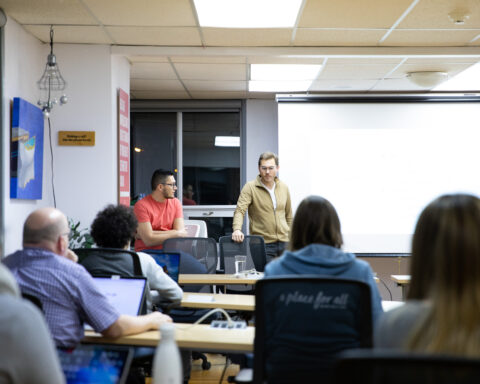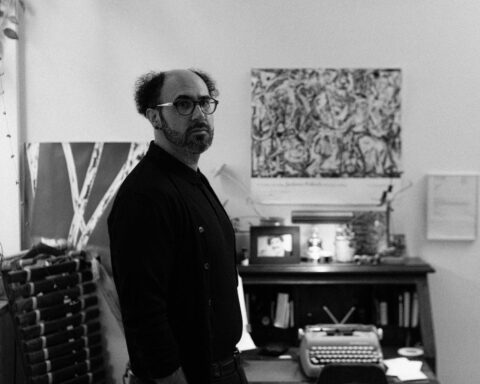Before reopening relations with Iran, the Canadian government should hold the Middle Eastern country accountable for human rights violations against minority religions, say some members of Canada’s Bahá’í community.
On January 27, 24 members of the Bahá’í faith, including two of Amir Parsa’s family members, were imprisoned in Iran.
“We know the political relationship between Canada and Iran is being restarted,” says Parsa. “My expectation is that if Canada wants to restart their relationship with Iran, they have to make it based on an agreement that Iran will stop these violations.”
Parsa says he learned about his relatives’ arrests on Facebook after a list was published on a page he follows of the detainees and information on their sentences — which range from six to 11 years each — on the day of their imprisonment.
“We already knew this was coming because they had been arrested in 2012, but they had both been released on bail,” explains Parsa. “We were just waiting for the sentence.”
The 24 imprisoned men and women range in age from 21 to 60 years old.
“They were given very heavy charges,” says Parsa. “One of them was accused of engaging in propaganda against the Islamic Republic of Iran.”
A representative of the Bahá’í International Community to the United Nations (UN) heavily condemned the verdict, stating the individuals were imprisoned for no other reason than their faith — a common occurrence in Iran, where the Bahá’í faith is not recognized in the constitution.
Parsa says it is not the custom of Bahá’ís to hide their beliefs, making it easy for the government to know who they are.
Evaluating how Canada will re-engage
Former prime minister Stephen Harper’s government suspended diplomatic relations with Iran in 2012. Prime Minister Justin Trudeau campaigned on the promise to reopen Canada’s embassy in Tehran, and Foreign Affairs Minister Stéphane Dion said this is just one step the new government is taking to restore relations with Iran.
John Babcock, a Global Affairs Canada spokesperson, states the department is “cautiously, but expeditiously, evaluating our process of re-engagement, but a precise timeline has not been determined.”
[F]ollowing Iran’s Islamic revolution, repression of Bahá’ís increased.
He adds that Canada has been one of the strongest voices condemning Iran’s human rights violations, including at the UN, where Canada has been the lead sponsor of the General Assembly resolution on the situation of human rights in Iran since 2003.
The Bahá’í faith originated in Iran in 1844, making it one of the youngest religions in the world.
“The most important thing is to remind ourselves all the time that the current system in Iran is a theocracy,” explains Amir Hassanpour, an associate professor in the department of near and Middle Eastern civilizations at the University of Toronto. He adds that Iran recognizes Judaism, Zoroastrianism and Christianity as religions, but not the Bahá’í faith.
According to Hassanpour, the reason why Bahá’ís are the most targeted religious minority is because they don’t recognize the prophet Mohammed as the last prophet Allah sent, and in Islam there cannot be any other prophet after Mohammed.
This explains why, following Iran’s Islamic revolution, repression of Bahá’ís increased.
A difficult time for Bahá’ís
Hassanpour lived in Iran when the Islamic Republic was founded.
“In 1979, Bahá’ís were required to renounce their religion and convert to Islam. They had to put an ad in the newspapers with a photograph of themselves saying they had renounced their religion and were not Bahá’í anymore,” explains Hassanpour.
“When we came back from summer vacation, our house was confiscated and our belongings were gone.”
It was a particularly difficult time for members of this religion, as dozens of Bahá’ís were killed or jailed; land, houses, shops and other belongings of the community were also seized. This was the case with Parsa’s family.
“When we came back from summer vacation, our house was confiscated and our belongings were gone. We were left with two suitcases,” recalls Parsa.
The family managed to live with family and friends for two years, eventually deciding to relocate to Turkey.
“We couldn’t get passports so we went over the mountains to Turkey, and claimed refugee status there,” says Parsa. “Then we waited for 15 months for the Canadian government to accept our refugee claim.”
Parsa and his family came to Canada in 1999, when he was 18 years old, allowing him to study, as Bahá’ís are systematically denied access to higher education in Iran.
In Iran there are currently over 80 Bahá’ís in prison out of an estimated population of 300,000.
Now 43, Parsa works as a computer engineer at a high-tech company in Ottawa. He recently sent a letter to Karen McCrimmon, his local member of Parliament for the Kanata-Carleton are, requesting to meet with her.
According to the Bahá’í Community of Canada, only 30,000 Bahá’ís live in Canada, which may explain why many people in this country aren’t aware of the existence of this faith, its followers or their unique set of challenges.
In Iran there are currently over 80 Bahá’ís in prison out of an estimated population of 300,000, according to the Bahá’í International Community. In 2013, 49 per cent of the country’s religious-minority related human rights violations involved Bahá’ís. This is despite promises made by President Hassan Rouhani to improve the human rights situation in Iran.
“Engagement does not mean that we agree with Iran’s policies, but it does establish a pathway towards economic opportunity, dialogue and regional security,” says Babcock. He adds that re-establishing relations with Iran would enable Canada to hold the country accountable on issues of human rights violations.





